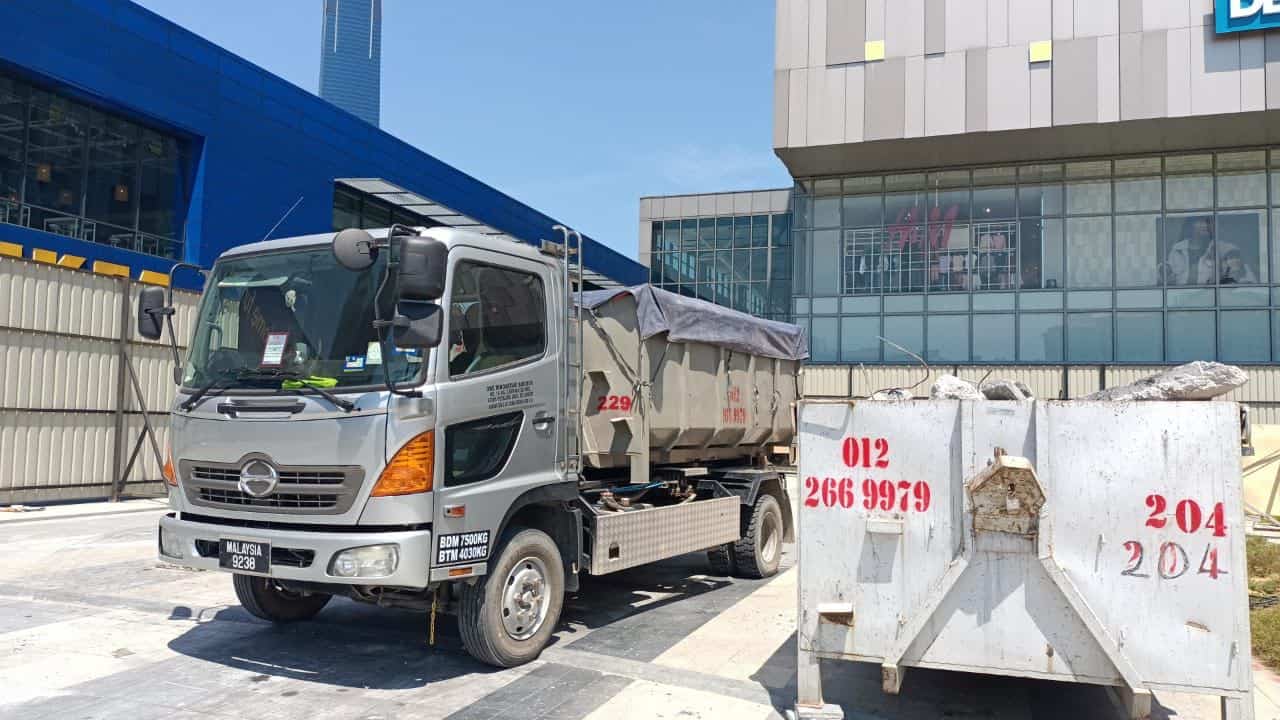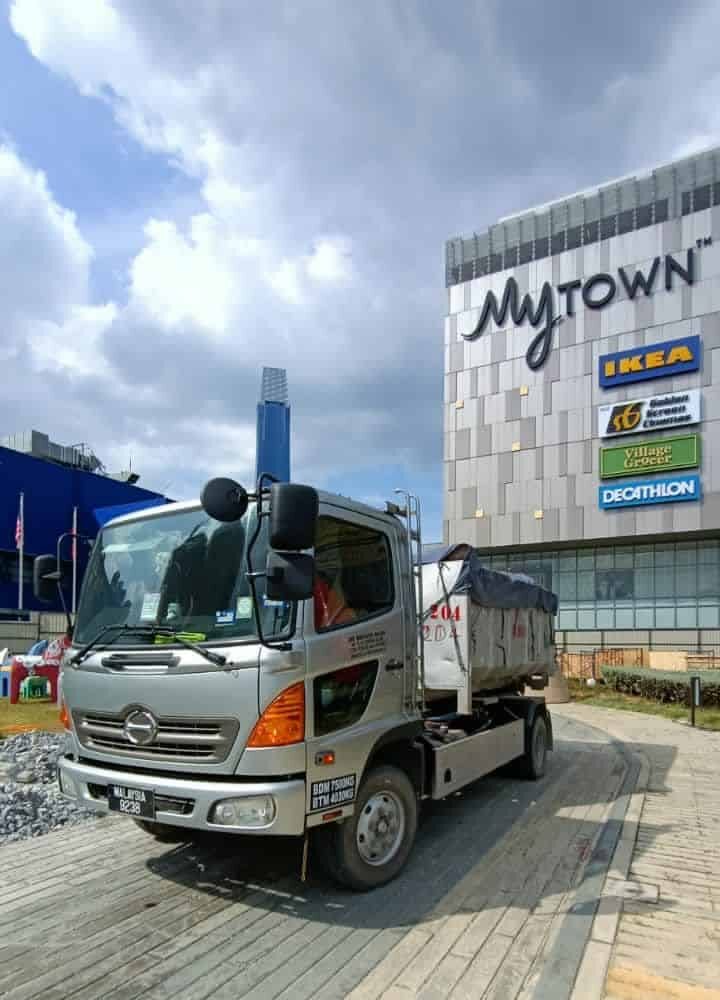RORO BIN RENTAL
Find The Right Size For Your Project

Small Roro Bin
Dimensions: 12′ (L) X 6′ (W) X 2.5′ (H)
Best Use: Heavy construction and demolition waste like concrete and soil.

Large Roro Bin
Dimensions: 12′ (L) X 6′ (W) X 4′ (H)
Best Use: Light-weight construction, industrial, commercial waste, furniture, household bulky waste, trees and etc.

Domestic Roro Bin
Dimensions: 12′ (L) X 6′ (W) X 4′ (H) with roof
Best Use: Domestic food waste (Organic waste).

Extra Giant Roro Bin
Dimensions: 16′ (L) X 8′ (W) X 6′ (H)
Best Use: Light-weight construction, industrial, commercial waste, furniture, household bulky waste, trees and etc.

Giant Roro Bin
Dimensions: 14′ (L) X 7′ (W) X 5.5′ (H)
Best Use: Light-weight construction, industrial, commercial waste, furniture, household bulky waste, trees and etc.
WHAT MAKES US DIFFERENT ?

Value Price

Express Service

Licensed Under Local Authorities

Quick Scheduling
TESTIMONIALS
OUR CLIENTS







PROJECT REFERENCE









Waste Collector
What Does It Mean to Be a Waste Collector?
Waste collectors are the backbone of our society, ensuring cleanliness, health, and sustainability by managing our waste. Though often an overlooked profession, their work is crucial for the environment, economy, and community health. So, what exactly does the job of a waste collector entail, and why is it so important? Let’s dive in!
Understanding the Role of Waste Collectors
Daily Responsibilities of a Waste Collector
Each day, waste collectors follow specific routes, collecting waste from residential and commercial areas, and sometimes dealing with hazardous materials. They ensure that waste is efficiently transported to disposal or recycling centers, helping maintain cleanliness and order in our neighborhoods.
Types of Waste Collected
Waste collection involves handling various waste types, including general household waste, recyclable materials, hazardous waste, and organic waste. This variety requires waste collectors to be knowledgeable about proper sorting and disposal methods.
Skills Required for Waste Collection
A waste collector’s job demands physical strength, endurance, and a strong commitment to safety. They also need good spatial awareness, attention to detail, and an understanding of waste management protocols to carry out their duties effectively.
The Importance of Waste Collection in Society
Environmental Benefits
Waste collectors play a pivotal role in reducing pollution by ensuring proper waste disposal. By diverting recyclable materials from landfills, they help conserve natural resources and reduce greenhouse gas emissions, which is essential for combating climate change.
Public Health and Sanitation
Without waste collectors, our communities would face severe health risks from accumulated waste. They prevent the spread of diseases, pests, and bad odors, making our living environment safer and more pleasant.
Economic Impact of Effective Waste Collection
Efficient waste management boosts local economies by keeping neighborhoods attractive, supporting property values, and creating jobs in the recycling and waste management industries.
Types of Waste Collection Services
Residential Waste Collection
Residential waste collection is the most common service, involving the weekly collection of household waste. This service is crucial for keeping neighborhoods clean and minimizing household waste buildup.
Commercial Waste Collection
Businesses and industries require specific waste collection services for larger amounts of waste, such as paper, plastics, and other commercial byproducts.
Hazardous Waste Collection
Hazardous waste includes materials that pose a risk to health or the environment. Waste collectors specially trained in handling and transporting hazardous waste ensure it’s disposed of safely.
- Medical Waste: This includes syringes, bandages, and other potentially infectious materials from hospitals and clinics.
- Industrial Hazardous Waste: Industrial processes produce waste that can be toxic, flammable, or corrosive, requiring careful handling.
Tools and Equipment Used by Waste Collectors
Collection Vehicles
Specialized trucks are used to collect and transport waste. These vehicles are designed to handle different types of waste and feature mechanisms for lifting and compacting trash.
Safety Gear and Protective Equipment
Waste collectors wear protective gloves, boots, helmets, and sometimes face masks to protect themselves from potentially harmful materials and exposure to bacteria or chemicals.
Waste Segregation Tools
To promote recycling and safe disposal, waste collectors use bins and containers that separate organic, recyclable, and hazardous waste.
Challenges Faced by Waste Collectors
Health Risks and Safety Concerns
Handling waste can expose collectors to health hazards like infectious diseases, sharp objects, and toxic substances. They face a high risk of physical injury and illness, making safety precautions essential.
Weather-Related Challenges
Waste collection is an outdoor job, so collectors work in all weather conditions, from extreme heat to freezing temperatures, which can add significant physical strain.
Social Stigma and Recognition Issues
Despite their essential role, waste collectors often face social stigma and lack of recognition. Efforts to change public perception and honor their contributions are essential to fostering appreciation for their work.
Innovations in Waste Collection
Smart Waste Bins and IoT Technology
Smart bins equipped with sensors notify waste collectors when they’re full, helping streamline collection routes and reduce fuel consumption.
Recycling and Waste-to-Energy Programs
Modern waste management focuses on recycling and converting waste into energy. These programs reduce landfill use and create renewable energy sources.
Autonomous Waste Collection Vehicles
In some cities, automated waste collection trucks are beginning to assist or replace traditional collection methods, improving efficiency and reducing labor costs.
How to Become a Waste Collector
Educational and Licensing Requirements
While waste collection doesn’t require a college degree, collectors often need a high school diploma and specific licenses, such as a commercial driver’s license (CDL) for operating waste collection trucks.
Necessary Training Programs
Training covers safety protocols, waste sorting methods, and handling hazardous materials. Many companies provide on-the-job training to ensure that new hires understand the requirements.
Physical Fitness and Endurance
The physical nature of the job means that waste collectors need good physical fitness, strength, and stamina to lift heavy bins and work in varying conditions.
Environmental and Social Impact of Waste Collectors
Reducing Carbon Footprint Through Efficient Collection
By optimizing routes and using eco-friendly vehicles, waste collectors reduce carbon emissions, contributing to the fight against global warming.
Enhancing Community Health and Cleanliness
Waste collectors create healthier environments by removing potentially harmful waste, making neighborhoods cleaner, safer, and more pleasant to live in.
Role in Recycling and Waste Management Awareness
Waste collectors are often the first point of contact in waste management and play a key role in educating communities about recycling and proper waste disposal practices.
Career Opportunities in Waste Collection
Advancement Paths within Waste Management
Waste collection can open the door to higher positions within waste management, such as supervisor, route manager, or even roles in environmental policy and planning.
Potential Earnings and Benefits
Waste collection is a stable career with competitive pay, health benefits, and job security, particularly in urban areas where waste collection is a continuous need.
Work-Life Balance and Job Satisfaction
The job can be physically demanding, but many waste collectors find satisfaction in knowing they contribute to a healthier, cleaner environment.
The Future of Waste Collection
Technological Advancements Shaping the Industry
Emerging technologies, like AI-driven sorting systems, are streamlining waste management and making the process safer and more efficient.
Increasing Public Awareness and Support for Waste Collectors
Public support and awareness are on the rise, as people recognize the environmental impact and importance of waste collection.
Sustainability Goals and Waste Reduction
With governments setting ambitious sustainability goals, waste collectors play a vital role in reducing waste, increasing recycling rates, and promoting eco-friendly practices.
Recognizing the Vital Role of Waste Collectors in Our Lives
Waste collectors are unsung heroes who keep our environment clean, safeguard public health, and contribute to sustainable practices. By acknowledging their contributions and supporting their efforts, we can create cleaner, healthier, and more sustainable communities.


